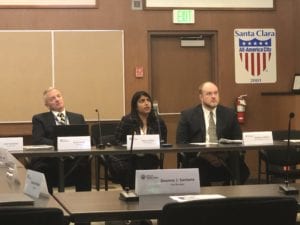Changes are on the way for Santa Clara when it comes to residential rental rules, including short-term rentals made popular by websites like Airbnb.
City elected leaders and planning commission members this month discussed changes for rentals that could affect how many people can rent a single-family home and create first time rules around short-term rentals — homes or rooms rented for fewer than 30 days at a time — which have been popularized by hospitality companies like Airbnb. The changes are being proposed for the city’s revamped zoning code, a draft of which will become available in the coming months.
The zoning code update, which governs where various types of buildings can rise and regulations around those spaces, will likely include new rules for live music and entertainment in the city, assisted living, safe parking and rental rules. The update will mark the first time in 50 years that the city has updated its zoning code, making the effort a major undertaking.
In its fourth study session to guide the new zoning code last week, councilmembers and planning commissioners discussed a set of new rules that aim to limit the number of people who can live together in a single-family home.

The potential changes come after “community members indicate that their quality of life is being negatively impacted by single-family residences that house a large number of occupants and as a result lead to noise disturbances, inadequate property maintenance and insufficient on-site parking,” according to city documents. Many of the complaints the city is fielding come from people in the Old Quad neighborhood, which sits near Santa Clara University.
But the city is walking a fine line in attempting to shift the language in its code because the federal government and the state have rules that prevent the city from limiting the number of people in a home, based on whether they are related.
Under the proposed changes, renters would need to demonstrate a “common living arrangement” by meeting one of the new requirements, including sharing a single lease, having shared living expenses or sharing in chores. The proposed code update would also limit the number of guests outside of that established “household” who are allowed to stay in the home for more than a month.
But those rules are relatively general, difficult to easily identify a breech and would be enforced only when there is a complaint, allowing for loopholes and exceptions, city officials acknowledged.
“We’ve had a lot of conversations around this with the community,” said Andrew Crabtree, community development director for the city. “There’s not a perfect solution… but this is definitely an improvement.”
As part of the effort to limit single-family homes from being used as a collection of individually rented rooms, the zoning code could also set new building requirements, such as a minimum of 25 percent of the house’s floor area must be “common habitable area,” such as a dining room, living room and kitchen.
That idea gained traction with lawmakers, though City Attorney Brian Doyle acknowledged it isn’t a foolproof way to avoid overcrowding because sometimes people use common areas to sleep, but don’t make architectural changes to the home. There are also many groups in the city who would qualify as a single household, he added, but are using common areas in their homes as bedrooms out of necessity.
“To be blunt, there’s lots and lots of related families who are sleeping in living rooms,” Doyle said. “And it gets harder when they haven’t done anything physically (to the home) and there are just people living in the living room. We have two very serious and competing issues here.”
Short-term rentals get a closer look
Meanwhile, councilmembers also considered rules around short-term rentals in the new zoning code, a big move for the South Bay city, which currently has no requirements for such rentals, aside from an agreement with Airbnb to collect Transit Oriented Tax, a tax applied to hotels.
Under the new proposed rules, property owners would be limited to renting out their homes as a “short-term rental” for no more than 90 days a year, unless they live on site. The new rules would also limit the number of people who can rent the home based on the number of bedrooms, with a maximum of eight people per home.
Property owners would be required to get an annual administrative permit and could be prevented from renting out their rooms via apps like Airbnb if they don’t comply with the rules, said Planning Manager Reena Brilliot.
The proposed changes drew support from a handful of residents, many of them sharing frustrations with living near a home used exclusively as an Airbnb. Some asked the city to do away with “unhosted” short-term rentals, which are homes rented out without the owner living on site.
“I appreciate the homelessness and the (housing) problems we have in Santa Clara. … I think having something unhosted is really the issue,” resident Shelly Woodworth said. “If you have somebody who is living in that home, they are going to be more concerned about who is coming in and out.”
A public draft of the new zoning code is expected in the next few months. The city’s Planning Commission will host a public hearing near the end of the year and the City Council is expected to hold a hearing on the new code in February before it is officially adopted.
Contact Janice Bitters at [email protected] or follow @JaniceBitters on Twitter.



Leave a Reply
You must be logged in to post a comment.